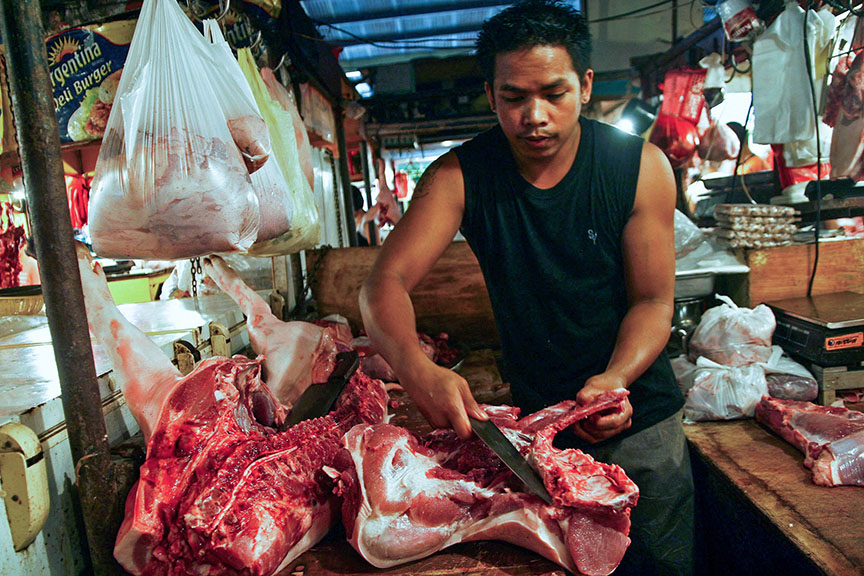MALAYBALAY CITY (MindaNews / 11 February) – The plan of the Department of Agriculture (DA) to import more meat products will “push the agricultural industry, especially the hog and poultry raising sectors, to its eventual death,” House Deputy Minority leader and Bayan Muna Rep. Carlos Isagani Zarate said in a statement Tuesday.
Citing the Philippine Statistics Authority, Zarate said the country has enough pork and chicken supplies, making it unnecessary to import these items.
 Slicing pork at the Agdao Public Market in Davao City. MindaNews file photo by RUBY THURSDAY MORE
Slicing pork at the Agdao Public Market in Davao City. MindaNews file photo by RUBY THURSDAY MORE
“As it is, data shows that the local production of pork and chicken is enough for its demand in the Philippines. According to the PSA, the per capita consumption of pork and chicken in 2020 is 15 kilos and 13.7 kilos, respectively. This translates to an estimated consumption of 1.5 million metric tons and 1,479.6 thousand metric tons. Meanwhile, local production of pork and chicken in 2020 is 2,142.65 thousand metric tons and 1,809.85 thousand metric tons, respectively,” he said.
“Now where does the DA get its data that there is a need to import? Is it saying that the PSA data is wrong?” he said.
Last month, Agriculture Secretary William Dar gave the go-signal to increase the country’s pork imports at lower tariffs with the reported shortfall in local supply attributed to the African Swine Fever.
Dar said the DA will triple the annual minimum access volume (MAV) of 54,000 metric tons (MT) to 150,000 MT, a move seen to pull down prices in the markets.
But in a news item posted on DA’s website Thursday, the secretary “expressed gratitude to private sector partners in the hog and poultry sectors for their active role in stabilizing supply and prices of the commodities in Metro Manila, thus ensuring accessible and affordable food for consumers.”
“This early, the Department of Agriculture (DA), along with other concerned government agencies, is pleased to see the smooth implementation of the price ceiling on pork and poultry products in Metro Manila since Monday, despite the threat of a ‘pork holiday’,” the official was quoted as saying.
“None of this will be possible without the help of partners from the private sector, who stepped up and provided the much needed support in order to bring the commodities to consumers at a reasonable price,” he added.
Last resort
Zarate said importation was supposed to the government’s last resort in dealing with rising prices, “since what should have been done first was to increase support for hog and poultry raisers so that they can also increase production.”
He said the DA was instead “itching” to triple the MAV and lower its tariff “without even consulting the stakeholders who would be severely affected by importation.”
The lawmaker said that during a dialogue local raisers and breeders as well as farmers groups recommended concrete programs to accelerate re-population of hog stock affected by ASF and a stop to more importation.
“They also demand the establishment of a real time data and information system to have an informed decision on policies and programs,” he said.
House probe
Zarate and other members of the Makabayan bloc in Congress filed on Monday a resolution asking the House committee on agriculture and food to conduct an investigation, in aid of legislation, “on the rising of food prices, importation and the neglect of the industry of agriculture in the Philippines.”
He said that under the 2021 General Appropriations Act, the DA only got P68.622 billion or 1.5 percent of the P4.506-trillion total national budget even if agriculture was contributing 8-10 percent of the country’s gross domestic product.
In a press release published on the Philippine Information Agency website last January 28, Dar said “agriculture will be a driving force as the country pushes ahead with recovery amid the Covid-19 pandemic. The onslaught of the ‘perfect storm’ — starting with the eruption of Taal Volcano, continued incidence of the African Swine Fever (ASF), and a series of strong typhoons that ravaged the country in the latter part of the year — have pulled down sectoral performance. We have learned from these crises. Now, we will turn these lessons into opportunities to recover strongly.”
He said the DA is confident of attaining a 2.5-percent growth in 2021. (H. Marcos C. Mordeno/MindaNews)
